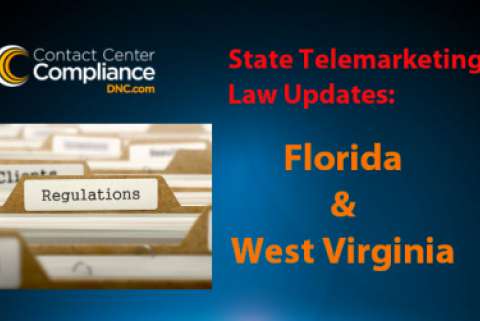States are continuing to enact telemarketing restrictions which are more stringent than their federal counterparts. The following are recent updates to the state telemarketing laws in Florida and West Virginia that you should be aware of before dialing into those states.
Changes to Florida’s Do Not Call Act:
The following changes are effective July 1, 2018:
- Expands the definition of "telephonic sales call" to expressly include technologies that deliver direct-to-voicemail messages. "Voicemail Transmissions" will now be viewed the same as "Telephonic Sales Calls" under the state's telemarketing act. A “Voicemail Transmission” will be defined as "technologies that deliver a voice message directly to a voicemail application, service, or device."
- Expands the prohibition on unsolicited delivery of telemarketing and charitable solicitation voicemail messages to “persons” to now include “businesses” that had previously communicated that they would not like to receive certain voicemail solicitations.
- Specifies that telemarketers must transmit their "originating" telephone number to the recipient’s CallerID and that a telemarketers or seller answer on that number.
- Requires telephone sellers to keep records of their calling information for two years after the date that the information first becomes part of their business records. Call logs, consent and request data, and scripts are all required to be saved for two years under new statute § 501.6175.
- Increases potential penalties per violation:
• Administrative Fines - $10,000 (from $1,000) per violation
• Civil Penalties - $10,000 or more (from $10,000) per violation
Expanded Restrictions to West Virginia’s Truth in CallerID Act
The following change is effective on June 8, 2018:
West Virginia has also passed a law (House Bill 4150) that puts additional regulations on telemarketers.
The new law prohibits the transmission of "misleading or inaccurate caller identification information, including, but not limited to, circumventing caller identification technology that allows the consumer to identify from what phone number or organization the call has originated from, or to otherwise misrepresent the origin and nature of the solicitation."
It is interesting to note that the original draft of the bill would have made transmitting misleading or inaccurate CallerID information a felony unless the caller owned or operated the name and telephone number displayed.
Telemarketers should be sure to understand these law changes, as well as other telemarketing laws across the country, to ensure full compliance and mitigate the risks of facing regulatory action.





